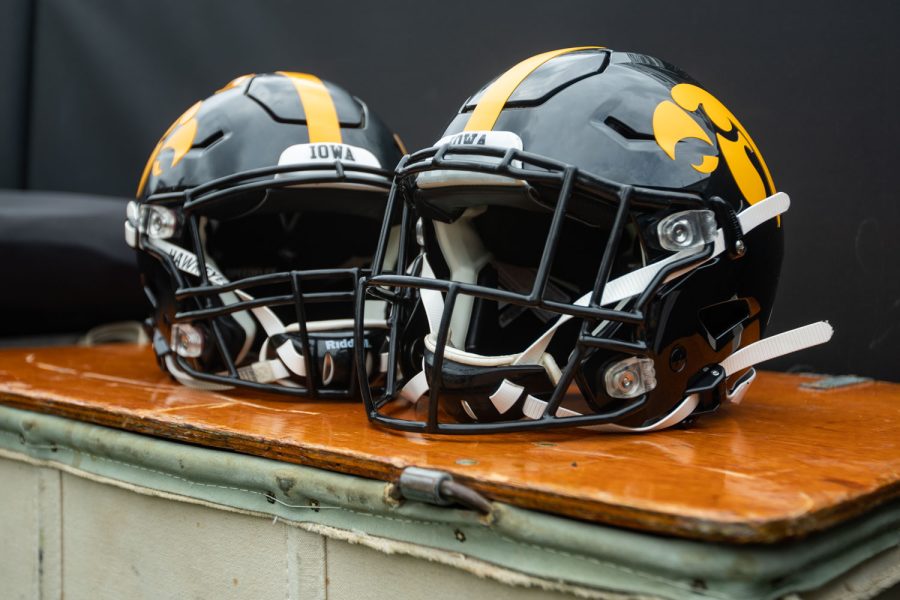UI, regents settle racial discrimination lawsuit for $4.2 million with former Iowa football players
The Iowa Athletics department will pay nearly $2.2 million in the settlement, as well as work with a UT-Austin professor for DEI initiatives.
Iowa helmets sit on the sidelines before a football game between No. 18 Iowa and No. 17 Indiana at Kinnick Stadium on Saturday, Sept. 4, 2021. The Hawkeyes defeated the Hoosiers 34-6.
March 6, 2023
The University of Iowa and state Board of Regents plan to settle a racial discrimination lawsuit with 12 former Iowa football players for $4.2 million on Monday.
The case’s plaintiffs — Akrum Wadley, Jonathan Parker, Marcel Joly, Aaron Mends, Maurice Fleming, Reggie Spearman, Kevonte Martin-Manley, Darian Cooper, LaRon Taylor, Brandon Simon, Javon Foy, and Terrance Harris — brought a lawsuit against the UI, the regents, and multiple Iowa football coaches in 2020, accusing the Hawkeye football program of racially motivated discrimination and harassment.
Head coach Kirk Ferentz, offensive coordinator Brian Ferentz, linebackers coach Seth Wallace, former strength and conditioning coach Chris Doyle, and athletic director Gary Barta were all dropped from the lawsuit earlier this week, leaving the UI and Board of Regents as the only defendants.
The Iowa Athletics department will pay exactly $2.175 million of the settlement costs, while the UI asked the state to pay $2 million from the taxpayer fund.
The settlement, which was approved by the State Appeals Board on Monday, involves a total of $4.175 million in attorney fees, legal costs, and a payout of settlement claims to the players. The players originally demanded $20 million in the lawsuit.
State Auditor Rob Sand, however, said he will not vote in favor of the settlement as long as Barta is still at Iowa.
The board is made up of three members: the auditor, the treasurer of state, and director of the department. The board needs just a majority to approve the money coming from taxpayer dollars. But the other two members of the state board of appeals voted in favor of the motion, putting the state on the hook for the $2 million payment.
Iowa Athletics has paid out multiple settlements in the past 10 years, including $6.5 million in a Title IX lawsuit from former field hockey coach Tracey Greisbaum and $400,000 to four women’s swimmers in a separate Title IX suit.
This is the first time the UI is requesting the state pay a portion of the settlement through the taxpayer fund, according to the Des Moines Register.
“Enough is enough,” Sand said in a statement to other board members. “Clear personal accountability is necessary. I will not support taxpayers funding this settlement unless Gary Barta is no longer employed at the university and forfeits any severance or similar pay. I encourage you to join me. Real accountability will help prevent discrimination, protecting both taxpayers and future victims.”
Other settlement terms
The UI will put $90,000 total toward the plaintiffs’ graduate or professional school tuition expenses, which will be reimbursed directly from the athletics department. The plaintiffs must submit for reimbursement before June 1, 2026, and it is capped at $20,000 per plaintiff. The university will also provide mental health counseling services for a one-year period beginning between March 15, 2023, and March 15, 2024.
As part of the settlement, the UI will pay for registration and travel expenses for up to 10 Hawkeye student-athletes to go to the Black Student Athlete Summit for the next three years.
The athletics department is also mandated to have nondiscriminatory access to pro day events and a recruiting plan for African American candidates for coaching internships.
The Iowa Athletics department will also work with Leonard Moore, a professor at the University of Texas at Austin, to help with the operations of the five-year diversity, equity, and inclusion plan.
Moore’s agreement with the athletics department runs from this March to May 31, 2024, and he will be compensated no more than $35,000 for the year. According to the settlement, Moore will work with Barta and other members of the athletics leadership team, including the senior associate athletic director for academic services and assistant athletic director for diversity, equity, and inclusion.
He will also meet with student-athletes and coaches twice in-person during the year and make recommendations on national opportunities for speakers and other programming.
Degree completion program
The settlement mandates the athletics department provide tuition assistance for the plaintiffs, as well as other student-athletes who did not graduate, to finish their undergraduate degree at the UI.
The Iowa Athletics Degree Completion Program will help former student-athletes finish their degrees at the UI.
“The Athletic Department remains committed to providing an inclusive and welcoming environment for every student-athlete and staff member involved in our program,” Barta said in a statement. “The Hawkeyes overarching goal to win every time we compete, graduate every student-athlete that comes to Iowa, and to do it right, remains our focus.”
The Student-Athlete Academic Services Office, head coaches, and sports administrators will try to reengage athletes who have 30 or fewer credits to graduate and intend to complete the program.
To be eligible for the program, student-athletes had to have completed their eligibility at the UI and received athletic aid in the process. While in this program, the students will qualify for up to the same percentage of aid they received as an athlete — not including room and board.
Dismissal of defendants
As part of the lawsuit, the plaintiffs agreed to file documents with the Polk County District Court to nonsuit or dismiss Kirk Ferentz, Brian Ferentz, Doyle, and Barta.
The plaintiffs will also dismiss the UI and regents with prejudice, meaning they cannot refile a case against the parties.
If the State Appeals Board does not approve the settlement, however, the UI and regents will toll any limitations for six months following dismissal or nonsuit, according to settlement documents.



